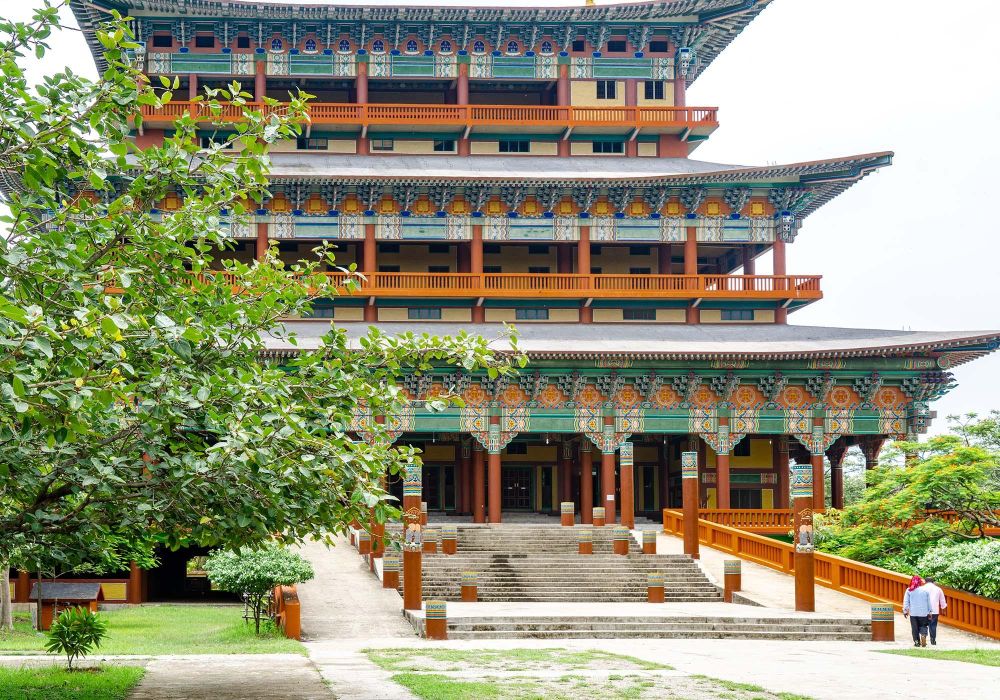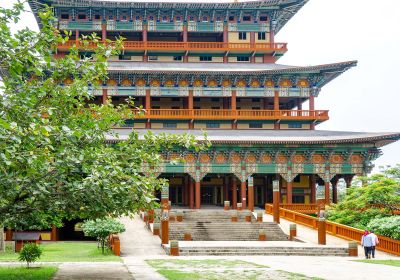

Experience the serenity of Dae Sung Shakya, an authentic Korean Temple in Lumbini, Nepal, through guided meditation sessions. These sessions last for about an hour. Conducted by experienced monks, participants are immersed in mindfulness practices rooted in Buddhist traditions. As you sit in the peaceful environment of the temple, surrounded by the sound of chanting and the scent of incense, you'll find a sense of inner peace and tranquility. The experience is suitable for beginners and experienced practitioners alike, providing a supportive atmosphere to deepen one's meditation practice. Price includes a comfortable seating mat and a small memento of the temple.
The Korean Tea Ceremony is a tranquil experience that reflects the nuances of Korean culture within the sacred precincts of Dae Sung Shakya. This activity lasts for approximately 30 minutes and involves the ceremonial preparation and presentation of tea. Participants will gain insights into the philosophy behind the ritual, which emphasizes harmony, respect, purity, and tranquility. Under the guidance of a temple monk, you will learn how to enjoy the tea mindfully, focusing on the flavor, aroma, and the act of sharing the tea with others. The ceremony is an intimate cultural exchange and a moment to unwind from the busy pace of travel.
Dae Sung Shakya offers a temple stay program that allows visitors to experience monastic life in a Korean temple. This program can extend from an overnight stay to several days. It includes participation in morning chants, meditation, communal work, and Dharma talks. The stay is an immersive experience that provides insight into the life of Buddhist monks and the principles they live by. Meals provided during the stay are vegetarian following temple protocols. Staying at the temple is a unique opportunity to detach from the distractions of daily life and explore spiritual practices in a setting of tranquility and reflection.
Join the Cultural Lecture Series at the Dae Sung Shakya to enrich your understanding of Korean Buddhism and its practices. These one-hour sessions are led by knowledgeable monks or scholars who specialize in a range of topics, including the history of Buddhism in Korea, Buddhist philosophy, and the role of temples in the community. The series is designed to be accessible regardless of one's prior knowledge and is aimed at fostering a dialogue between different cultures and belief systems. Attending a lecture at this beautiful temple combines educational enrichment with the unique chance to ask questions and engage with the teachings of Buddhism.
Explore the grounds of Dae Sung Shakya with a Mindfulness Walking Tour. This tour, lasting around an hour, includes mindfully walking around the temple gardens and adjacent areas while practicing awareness and breathing techniques. The guide will help participants cultivate presence and appreciate the natural beauty and spiritual ambiance of the surroundings. Strolling past the temple's architecture and hearing stories about its significance is not just a tour; it's a way to connect more profoundly with the environment and oneself. Suitable for all ages and fitness levels, this experience offers a chance to enjoy Lumbini's sacred landscape mindfully.
Visitors to Dae Sung Shakya are invited to join the daily prayer services held within the temple. Lasting around 30 minutes, these services are a central part of the temple's daily routine, creating a rhythm that harmonizes with the spiritual atmosphere of Lumbini. Participants can sit alongside the temple's monks and followers, chanting mantras and experiencing the vibrancy of group prayer. Although the prayer is conducted in Korean, guests from all backgrounds can find common ground in the shared spiritual experience. No prior experience is necessary, and instructional materials are available for newcomers.
Throughout the year, Dae Sung Shakya celebrates various Buddhist festivals with ceremonies and special events. Participation in these events typically spans a few hours and offers a deeper insight into the rituals and customs of Korean Buddhism. Visitors can witness colorful processions, ritual dances, and offerings, and even partake in some of the festivities. Festival days are lively and filled with meaning, reflecting the communal aspects of the temple's spiritual practice. Note that festivals follow the lunar calendar; hence the dates vary each year.
Dae Sung Shakya's Buddhist Art Workshop invites visitors to engage with Buddhist art through hands-on activities. These workshops, usually ranging from 1 to 2 hours, may involve painting, sculpture, or creating mandalas. Under the tutelage of art instructors with a deep understanding of Buddhist symbols and motifs, participants can create their own piece of spiritual art. The workshops are designed to be therapeutic and informative, offering a reflective space to understand Buddhism's artistic expressions. All materials are provided, and no prior art experience is needed to enjoy this creative experience.
Dae Sung Shakya also offers yoga sessions within its peaceful environment. These yoga sessions last for around an hour and are suited for both beginners and intermediate practitioners. Conducted by experienced yoga instructors, the emphasis is on gentle postures, breath control, and meditation, aiming to complement the tranquil vibe of the temple with the restorative practice of yoga. Participants leave feeling rejuvenated and in harmony with their surroundings. This activity is a beautiful way to integrate physical well-being with spiritual peace.
The Alms Round is a significant part of the monastic tradition in many Buddhist countries, and Dae Sung Shakya invites visitors to observe or participate in this humble practice. The event usually occurs early in the morning and lasts about an hour. Monks walk in a silent procession to receive offerings of food from laypeople, symbolizing the interdependence between the monastic community and the lay community. Observers can watch this poignant practice or offer food themselves, following guidance from temple attendees on proper etiquette and the symbolism of the alms round.
